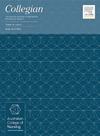应对澳大利亚皮肤癌危机的护士主导护理模式:讨论文件
IF 1.7
4区 医学
Q2 NURSING
引用次数: 0
摘要
背景:皮肤癌的早期检测对改善健康状况至关重要。许多生活在偏远地区和农村地区的澳大利亚人患皮肤癌的风险增加,但在进行皮肤癌筛查方面面临重大障碍。澳大利亚正在改革其目前主要由全科医生主导的机会主义筛查系统,并将制定一项资助的国家计划,对高风险人群进行黑色素瘤筛查。目的为提高澳大利亚地区初级保健护士在皮肤癌预防和早期发现方面的技能提供实用见解。护士作为区域地区最大的卫生人力资源,处于理想的位置,可以弥合在获得关键预防性卫生保健方面的差距,特别是使用人工智能和远程皮肤科等创新技术。护士主导的模式可以包括全面的教育和培训计划,在大型区域社区活动中提供方便的流动皮肤检查诊所,并与其他卫生专业人员合作进行后续护理。护士主导的方法可以减少皮肤癌结果的差异,提高早期检出率,并为国家定向皮肤癌筛查计划提供信息。结论提高澳大利亚地区初级保健护士在皮肤癌预防教育和早期发现方面的技能,为满足高危人群的筛查需求提供了一种创新的解决方案。本文章由计算机程序翻译,如有差异,请以英文原文为准。
A nurse-led model of care in response to Australia’s skin cancer crisis: A discussion paper
Background
Early detection of skin cancer is critical for improved health outcomes. Many Australians living in regional and rural areas are at an increased risk of skin cancer yet face significant barriers in accessing skin cancer screening. Australia is reforming its current system of primarily opportunistic, General Practitioner-led screening, and will be developing a funded national program to screen for melanoma in people at highest risk.
Purpose
To provide practical insights into the upskilling of primary care nurses working in regional Australia in skin cancer prevention and early detection.
Discussion
Nurses, as the largest health workforce in regional areas, are ideally positioned to bridge gaps in access to crucial preventive health care, particularly using innovative technologies such as artificial intelligence and tele-dermatology. A nurse-led model can include a comprehensive education and training program, providing convenient mobile skin check clinics at large regional community events, and working collaboratively with other health professionals for follow-up care. A nurse-led approach can reduce disparities in skin cancer outcomes, improve early detection rates, and inform the National Targeted Skin Cancer Screening Program.
Conclusion
Upskilling primary care nurses working in regional Australia in skin cancer prevention education and early detection provides an innovative solution to meet the screening needs of high-risk individuals.
求助全文
通过发布文献求助,成功后即可免费获取论文全文。
去求助
来源期刊

Collegian
NURSING-
CiteScore
2.70
自引率
6.70%
发文量
127
审稿时长
72 days
期刊介绍:
Collegian: The Australian Journal of Nursing Practice, Scholarship and Research is the official journal of Australian College of Nursing (ACN).
The journal aims to reflect the broad interests of nurses and the nursing profession, and to challenge nurses on emerging areas of interest. It publishes research articles and scholarly discussion of nursing practice, policy and professional issues.
Papers published in the journal are peer reviewed by a double blind process using reviewers who meet high standards of academic and clinical expertise. Invited papers that contribute to nursing knowledge and debate are published at the discretion of the Editor.
The journal, online only from 2016, is available to members of ACN and also by separate subscription.
ACN believes that each and every nurse in Australia should have the opportunity to grow their career through quality education, and further our profession through representation. ACN is the voice of influence, providing the nursing expertise and experience required when government and key stakeholders are deciding the future of health.
 求助内容:
求助内容: 应助结果提醒方式:
应助结果提醒方式:


